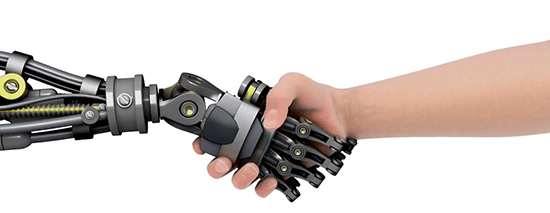Could robots make a better Brexit decision than our MP's?
07-06-2019 | By Paul Whytock
The answer, despite the perpetual comedy of our elected Members of Parliament scampering around like headless chickens trying to reach a sensible Brexit decision, is no.
It’s no because robotic artificial intelligence (Ai) will never replace human Ri - Real intelligence.
Now, thanks mainly to the aforementioned Brexit parliamentary pantomime, you'd be forgiven for thinking the abbreviation MP stands for Muppets but the fact is as humans, politicians do have Ri, albeit in various quantities and quality.
The thing is I just do not buy into the robotic Ai scare theories that droids will steal the world from us humans and turn us into their slaves or an extinct species. There are a lot of technological reasons why and here's the first one.
We all know the human brain is an incredible computer with immense capability in a wide-raging number of physical, physiological and emotional scenarios. What's not so well known is it manages all that constant and immense processing on an extremely small amount of electrical power, about 0.19Watts.
Non-Silicon Grey Matter
In comparison, a robot with a processor as smart as the human brain would require at least 10MWatts to operate. That's the amount of energy produced by a small hydroelectric plant. So it looks like robots will never get to takeover the world unless there is some other non silicon-based technology acting as their grey-matter.
There is no doubt that the continued development of capable algorithms and neural networks will play a major role in the attempt to make robots the intellectual equals of their human creators.
But the metamorphosis of robots into a world-dominating master race has some hugely pragmatic fundamentals to deal with. Here are a few of the evolutionary hurdles.
You Need Hands
The fact is scientists and robotic engineers are still a very long way from truly replicating the manoeuvrability, flexibility and sensitivity of the human hand.

An important point here is there is absolutely no technological substitute for the number and variety of tactile sensors contained in human skin. This sensitivity is essential for any robotic operations that must totally emulate the capability of the human hand. And even if this sensitivity was achieved the software that processes the input from robotic sensors is nowhere near as sophisticated as the computational ability of the human brain when it comes to interpretation and reaction to the messages received from human tactile sensors.
There is also another major dichotomy when it comes to robotic hand design and its called Moravec's Paradox. This focuses on the fact that it's actually much easier to program a robot to do something mathematically complicated like rapidly calculating all the moves to win a chess game. But ask it to pick up and move an actual chess piece to another board position whilst also thinking about future moves and, unlike humans, robots it runs into big problem.
Simply put humans can do many things almost unconsciously thanks to their inherent sensorimotor abilities that are controlling unconscious skills while their brain is thinking about something else.
Programming a robot to behave like that would require currently unattainable levels of programming and processing capability.
Making The Right Moves
Sensorimotor skills are the way in which a combination of our sensory information that is provided by smell, taste, touch, hearing, sight and something called proprioception is processed by the human brain and allows us unconsciously to make the right movement response.
Lets just focus on that last item, proprioception and imagine the algorithmic sophistication to make a robot do what a human does unconsciously.
Proprioception lets us automatically know the location, movement and action of parts of our body. It involves a load of very sophisticated sensory inputs from receptors in the skin muscles, ligaments and joints that create data that corresponds to our bodily positions. This information is automatically correlated to additional data that's related to our muscular activity and effort. All this is processed by the human brain and creates the signals required to activate suitable motor responses.
A second substantial technology hurdle involves the infinite possibilities when it comes to human and robot interaction. Humans interact via speech, physical movement, body language and infinitely variable facial expressions. There is even the human way of communicating not just by the word that is spoken but by the way it is pronounced. The numerous ways in which the everyday expression "thank you" can be delivered being a prime example.
Providing a robot with those skills is just not feasible and are of course not required when it comes to work like spot-welding car body panels together.
When Humans Say No
This is a crucial point. Even if all the above mentioned technical hurdles are overcome, which I strongly doubt, human Ri can always decide that it doesn't have to build what may be robotically possible in future, particularly if there is a risk to mankind. However given that one of mankind's weaker traits is an ability to resist everything but temptation there would certainly have to be legally enforced regulations to ensure that didn't happen.
So as far as world dominating super-robots go I'm on the side of humans but robots can make fantastic work partners.
Take the area of medicine for example. During an operation robotic algorithms can interpret the surgical team’s working positions and postures to determine the next stage of the operation and predict which instruments the surgeon will require. Robotics also provides an extremely important opportunity for far more precise, accurate and safer surgery by transmitting the movements made by the surgeon into much smaller surgical moves. This means for example that a 1cm movement of a scalpel by a human surgeon would be transmitted by a robotic arm as 0.5mm. But let's not forget it is the surgeons Ri that knows such a manoeuvre is required in the first instance.
So ultimately it's human Real intelligence that foresees what has to happen and what strategies are required to fulfil a given task. Robots are tools that we can use when given the right instructions. They are programmed to recognise certain things. Put something in front of them they do not recognise and they become confused and inactive.

And that point brings us back to the Brexit fiasco. Ri will of course eventually resolve that conundrum, but exactly how and when currently seems to be evading the Ri quotient of many of our MPs.

